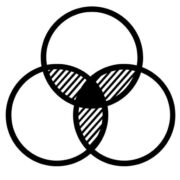The original TPACK framework refers to this as “Content Knowledge” and is described as:
“Teachers’ knowledge about the subject matter to be learned or taught. As Shulman (1986) noted, this knowledge would include knowledge of concepts, theories, ideas, organizational frameworks, knowledge of evidence and proof, as well as established practices and approaches toward developing such knowledge”
(Koehler & Mishra, 2009, p. 63)
Whilst I understand that Content Knowledge was a domain which featured in Schulman’s original PCK for the purposes of SPaM I have purposefully moved away from the term “content” for the reason that in it’s practical applications through most discussions I have had using the TPACK framework this quickly becomes associated with learning resources. A reading of the original definitions will clearly show that this wasn’t the intention of the authors of TPACK but the every day lived experiences of using this terminology shows that perception of terms often trumps the author’s intentions! In the case of TPACK and the pre-conceptions of the term “content” it is not helpful to drive conversations towards that of “learning resources”, after-all this use of “content” shouldn’t be the driver or focus for the discussions relating to curriculum design.
Therefore in the context of curriculum development I have presented it through the SPaM framework as knowledge of the ‘subject’ area (sometimes also referred to as discipline area) which is most certainly fundamental in the design of curriculum and the teaching of it, hence the shift of terminology to “subject” domain within SPaM. A deep understanding of the subject area is critical to the design process and as such a key component of an effectively designed hybrid education experience.
In the context of Higher Education undergraduate degrees the ‘subject’ matter to be taught is often heavily influenced in the UK by the QAA benchmarks statements and also Professional, Statutory and Regulatory Bodies (PSRBs) associated with specific discipline areas and is often the starting point for many curriculum design conversations.
Additionally, each academic staff member who teaches on the course/programme will also bring an element of subject expertise to the programme which will also strongly influence some design of the programme of study and subsequently, the subject matter being taught. In more recent years we have also seen employers influencing curriculum design activities and elements of the subject matter, especially where undergraduate programmes are developed for specific graduate level careers such as in business or law for example.
In summary all of these inputs are helping to inform the subject matter, and furthermore specifying the knowledge which students will need to have demonstrated throughout the programme in order to achieve the award (usually presented to students as learning outcomes (programme and module)) which are associated with assessments to be completed.
Regardless of the subject matter itself, a common approach to curriculum design I often draw upon is Constructive Alignment, which seeks to align the learning outcomes with the assessments and teaching activities. This can help facilitate a structured learning & teaching experience of a subject by explicitly connecting the learning outcomes, assessment tasks and learning activities.
It is therefore critical that ‘subject’ remains a key component of the curriculum design discussions and as such is a core domain of the SPaM framework.
You can find a full list of references for this work on the references resource page.
To cite this work:
Thomson, S. (2022, February 3). SPaM – A Framework to support the Development of Hybrid Education. SPaM Framework. https://spam.digisim.uk
